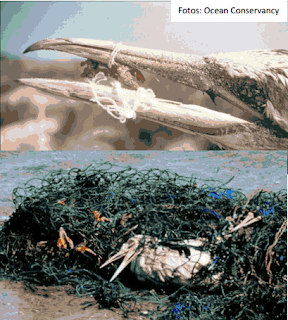![]()
 Like other marine species, birds can also be affected by marine debris due to entanglement, ingestion and habitat alteration.
Like other marine species, birds can also be affected by marine debris due to entanglement, ingestion and habitat alteration.
The tangle
Fishing gear at sea or on beaches is one of the main causes of entanglement of birds, which can even lead to their complete immobilization.
According to Greenpeace, there are records of entanglements in 56 species of sea and coastal birds, the most common being pelicans and gannets, followed by gulls, albatrosses, petrels and shearwaters.
These birds can become entangled for reasons as diverse as being caught in the debris they use to make their nests. Birds have often been found with their beaks entangled, so they can no longer obtain their food or feed their chicks.
The ingestion of marine debris
Birds are also affected by this problem because they can ingest garbage (pieces of plastic or metal) that they mistake for food) or by eating fish that have previously ingested this waste (especially microplastics).
It is estimated that of the 312 species of seabirds, at least 111 have ingested garbage.
After ingesting plastic (and in cases where ingestion did not cause immediate death due to obstruction of the digestive tract) it can take between 6 months and two years for the plastic to be completely degraded.
The accumulation of microplastics in seabirds can cause: reduction in body mass, reduced digestive efficiency, obstruction of the gizzards, hormonal alterations.
Other damages
Marine litter also affects the habitat of birds, and can even cover nesting areas and prevent the reproduction of these species.
The presence of marine debris near nests exposes parents and chicks to entanglement or ingestion of this waste. This debris can completely cover what was usually a common resting or nesting site for birds.

